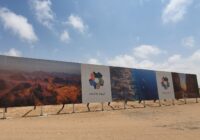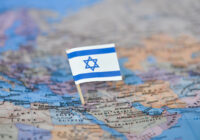Ordinary Palestinians say they understand Israel’s security goals. But they feel these policies are applied with irrational, random vengeance against the innocent.
After President Donald Trump’s announcement on December 6, 2017, that the US embassy in Israel would be moved to Jerusalem, images of Bethlehem as a Christmas idyll were replaced with rock-throwing Palestinians and Israeli military vehicles. Political rhetoric and violence escalated, with the US announcing the decision to withhold $65 million in UN funds from Palestine. The Palestinian Authority’s representative in Washington, Husam Zomlot, addressed a packed room at the Middle East Institute in Washington last week. Trump didn’t just take Jerusalem off the negotiating table, Zomlot said, “he took the whole table.”
American news programs show Palestinian protests and Israeli response. But on my recent trip before Trump’s announcement, I saw a different Palestine. It had all the traditional elements one would habitually think of: a Greek Orthodox priest presided over Jacob’s Well, where Jesus asked a Samaritan woman for a drink of water, and olive groves are harvested with the first rain.
But this other Palestine also had international software firms, optimistic university students and great local ice cream. We met people at technology, construction and food processing firms, and municipal officials were busy developing e-services for residents. Souks sold spices and vegetables of every kind, along with iPhones and Haagen-Dazs.
In this other Palestine, we saw a film student’s premier, musicians from the New York Philharmonic teaching teenagers how to be composers, and young women learning to produce traditional pottery. Millennials went out for a late-night shawarma, drove too fast, shopped for dinner and checked Facebook. Bethlehem University seems an arboretum, an oasis for learning and growing, out of sight of the nearby walls, barbed wire and violence.
Beyond the markets, restaurants and holy sites this was still occupied territory. Palestinians described the land grabs, border walls and checkpoints, and the restrictions on everything from travel to digging water wells. They asked us, How long can occupation be the answer?
Ordinary Palestinians say they understand Israel’s security goals. But they feel these policies are applied with irrational, random vengeance against the innocent. When people can’t get to school or work, and when young people get strip-searched at checkpoints (an account different people attested to me was true), they asked, What is Israel really hoping to accomplish? Without a permit, which can be difficult to acquire, Palestinians can be restricted from leaving the West Bank altogether.
Located quite literally above all this are the “settlements” — new-housing developments sometimes carved out of Palestinian agricultural hilltops. But in Hebron, one urban settlement extends over the city’s old market, just meters from the holy tomb of Abraham — the Cave of Machpelah/Ibrahimi Mosque. Settlers threw down so much trash that netting had to be secured over the market. On my last day, there were news reports that olive harvests near Nablus and Ramallah had been seized by settlers. I wondered, What would Abraham do?
Jewish friends of mine have pointed out that I can’t understand: I didn’t grow up facing the Intifada, and none of my family was lost in the Holocaust. American presidents have recognized Israel’s legitimate security needs in a two-state solution. Both should be democratic, prosperous and secure. But the Palestinians I met see overwhelming US support for Israel, and they asked me, How is the current situation justifiable?
A new art gallery in Ramallah illustrates decades of resistance to occupation, and I anticipated decades more. But the graffiti on the Palestinian side of the West Bank wall — peace doves, Trump satire, pizza ads — chronicles desperate, ironic, yet hopeful Palestinians.
I’ve worked in postwar Bosnia, among Mexican migrants and in independence-minded Iraqi Kurdistan. The Palestinians I met told me to look at Northern Ireland, South Africa and pre-unification Germany. These places are not the same as Palestine, but all of these divisions were long considered unsolvable. Each still has problems today, but overall the situations are much improved.
My new colleagues emphasized that occupation imposes many restrictions, but it had not vanquished all hope. Some of that has changed now, since Trump’s embassy announcement. One friend told me that Israeli soldiers have increased their use of rubber bullets and tear gas. Another fears that Israel is hoping to provoke a real armed uprising so it can crush it and justify further occupation.
Zomlot, the Palestinian representative in Washington, says the only way forward now is multilateralism. The Iran nuclear deal and Paris Climate Agreement survive only because they are multilateral agreements instead of being solely US creations. Europe, Zomlot continued, can provide critical leadership and legitimacy: Jerusalem, after all, is as close to the EU (Cyprus) as New York is to Washington or London is to Paris.
It’s a century since the Balfour Declaration, 70 years since Israel’s founding and five decades since the Six-Day and Yom Kippur Wars. Compromises, commitments and real leadership are needed to avoid another generation — or two, or three — of the status quo.
*[An earlier version of this article was published by The Times of Israel.]
The views expressed in this article are the author’s own and do not necessarily reflect Fair Observer’s editorial policy.
Photo Credit: Ryan Rodrick Beiler / Shutterstock.com
Support Fair Observer
We rely on your support for our independence, diversity and quality.
For more than 10 years, Fair Observer has been free, fair and independent. No billionaire owns us, no advertisers control us. We are a reader-supported nonprofit. Unlike many other publications, we keep our content free for readers regardless of where they live or whether they can afford to pay. We have no paywalls and no ads.
In the post-truth era of fake news, echo chambers and filter bubbles, we publish a plurality of perspectives from around the world. Anyone can publish with us, but everyone goes through a rigorous editorial process. So, you get fact-checked, well-reasoned content instead of noise.
We publish 2,500+ voices from 90+ countries. We also conduct education and training programs
on subjects ranging from digital media and journalism to writing and critical thinking. This
doesn’t come cheap. Servers, editors, trainers and web developers cost
money.
Please consider supporting us on a regular basis as a recurring donor or a
sustaining member.
Will you support FO’s journalism?
We rely on your support for our independence, diversity and quality.







